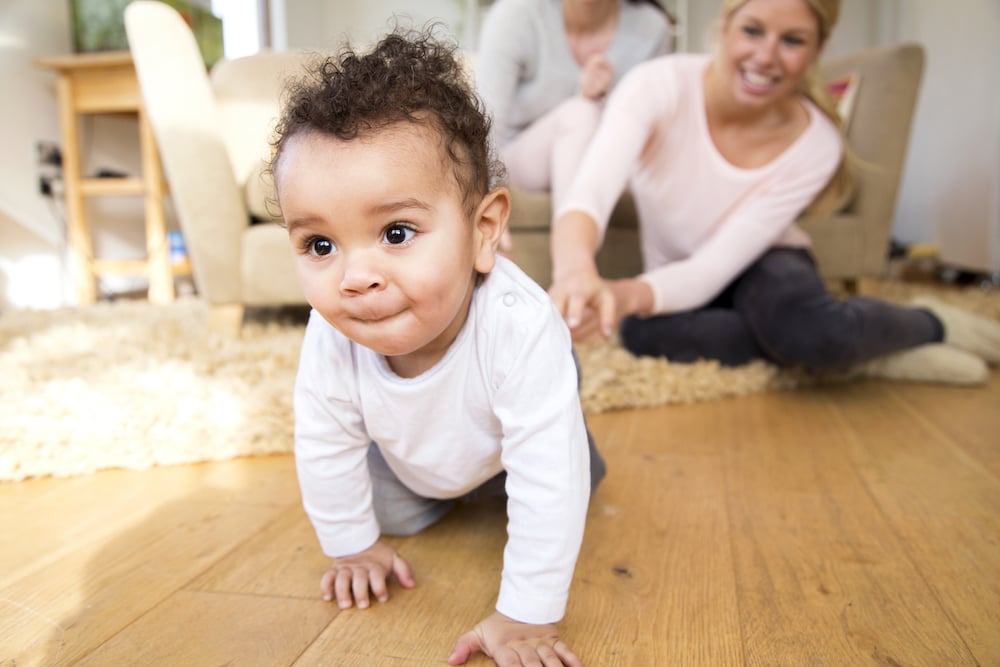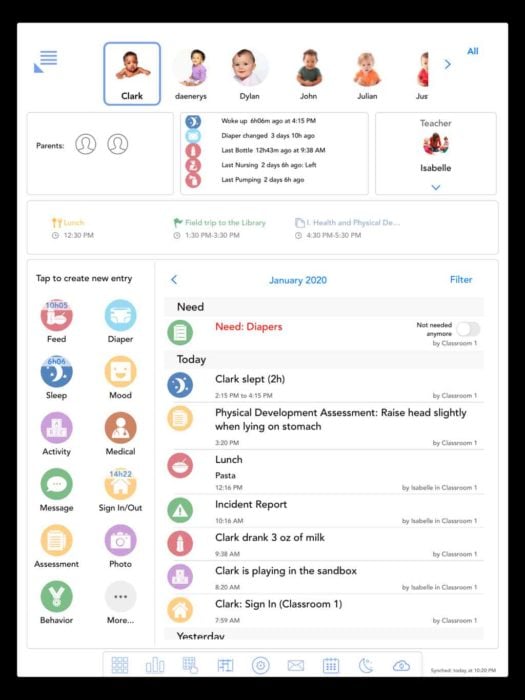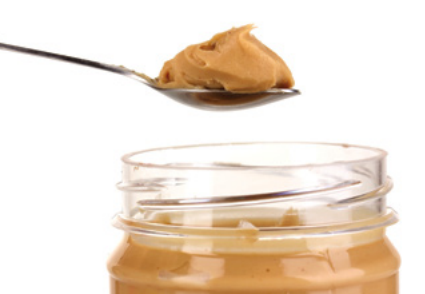It’s not such a bad thing when babies come into contact with dirt — and even some germs and allergens — in the first year.
You always boil Baby’s bottles between uses. You wipe down the play area each evening and you scrub those pacifiers with soap every time they touch the ground.
Right? No? Well, then, good news is in store for you.
Recent medical research shows that ingesting some dirt — and a few germs and allergens — may not be such a bad thing for infants. In fact, letting the house go a bit during an infant’s first year may actually help your baby’s immune system develop normally, possibly preventing allergies and other serious ailments later in life.
THE LOGIC
Infants seem to put everything in their mouths. But why?
If this impractical “mouthing” behavior is so bad for babies, why haven’t humans evolved out of it by now? Wouldn’t that help reduce vulnerable infants’ exposure to disease-causing germs?
Well, according to recent UCLA research, mouthing may have evolved in infants precisely to teach children’s immune systems how to function properly when such pathogens present themselves.
In a Minnesota home, potential allergens might include pet hair, summer mold or ragweed pollen, for example. These triggers usually aren’t harmful to humans. Yet in some individuals, the immune system mistakes them as dangerous and kicks off sometimes severe inflammatory responses.
However, exposure to local allergy or asthma triggers early in life — especially within a child’s first year — may actually help teach the immune system what is and isn’t dangerous, preventing these reactions in the future.
To better understand this phenomenon, consider the case of peanut allergies.
Peanut protein itself isn’t dangerous to the human body, and most people’s immune systems recognize that. However, some people’s immune systems, especially those that haven’t had much exposure to peanuts, mistake peanut protein for a dangerous substance, causing the immune system to rally its troops — resulting in dangerous inflammation and swelling.
The American Academy of Pediatrics recommended that the introduction of peanut butter, or other allergenic foods, shouldn’t start until at least 3 years old.
However, it was found that the rate of peanut allergies didn’t decrease in the subsequent years, despite the widely supported recommendation. In fact, rates of childhood peanut allergies more than tripled from 1997 to 2008, according to one study.
Then a new study published in The New England Journal of Medicine found even more reason to believe that delaying peanut butter exposure might be unnecessary.
More than 600 infants at high risk for allergies were divided into two groups. One group was given a cereal made with peanut butter as early as 6 months of age. The other group was told to not eat any peanut products until they were 5 years old. Researchers found that the group with early introduction had only a 3% rate of peanut allergies, compared to a 17% rate in the avoidance group.
Today the APP recommends introducing infant-safe forms of peanuts (such as peanut butter versus nuts) as early as 6 months. Even earlier introduction (4 months old) may be recommended under a doctor’s supervision — and possibly combined with allergy testing — for infants who have severe eczema requiring prescription treatments or who have an egg allergy. (Learn more at tinyurl.com/peanuts-aap.)
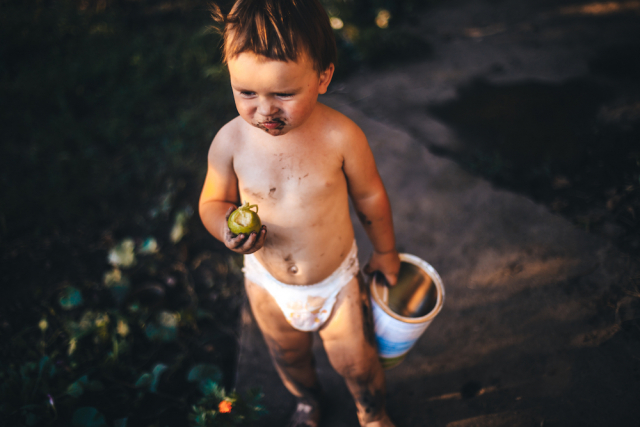
BEYOND PEANUTS
This same idea applies to non-food items. Researchers studying patterns of allergy and asthma have reported that a “too clean” home can prevent children from experiencing important early exposures to environmental allergens.
Allowing infants under age 1 to be exposed to dust, mold, mites and other household nuisances may help condition the immune system not to overreact to these potential triggers later in life, according a study The Journal of Allergy and Clinical Immunology.
A slightly different process may occur in children who are exposed to friendly bacteria through cats and dogs, or through such activities as a parent sucking the dirt off a fallen pacifier rather than boiling it.
Animals and adult mouths both contain a lot of bacteria. It may be that certain microbes, or perhaps entire networks of microbes, can help shape the immune system’s response to the wide array of new substances it may encounter.
A study published in the New England Journal of Medicine tried to find out whether microbial exposures were responsible for the low incidence of allergies and asthma among Amish populations in the U.S.
By comparing Amish immune responses to more allergic and asthmatic Hutterite immune responses (Hutterite communities have a similar genetic background to Amish communities, but far less contact with barn microbes), the study suggested that it may have been the microbial exposures among the Amish that made the difference. Agricultural lifestyles, it turns out, may contain lots of opportunities for the right kind of microbial exposures.
Yet Minnesotans, like the rest of the U.S. population, are increasingly moving to urban areas. Besides moving to a farm, is there anything you can do to increase your child’s microbial exposure? There might be.
A study by a team of Swedish researchers published in the journal Pediatrics showed that children whose parents used their own mouths to clean a pacifier had a lower incidence of airborne and food allergies — presumably because infants’ mouths are then colonized by friendly, immune-system-regulating bacteria from their parents’ mouths.
Dr. Cassie Wilder, a Minneapolis-based naturopathic medical doctor with a focus on hormonal and digestive concerns, added: “There are also a lot of other great things found in saliva — digestive enzymes, hormones such as cortisol and immune system proteins that can help stimulate and regulate the child’s immune system.”
COLDS, SCHMOLDS
OK, wait. Don’t contagions throw a monkey wrench in this “get-dirty” philosophy? Shouldn’t parents keep common spaces clean to prevent the spread of common diseases?
Well, contagions, too, might yield some benefit to the immune system. Researchers have found that children who attend daycare before age 1 were more likely to get a stomach bug during that first year than their peers who stayed home.
But after that, they were actually less likely to get stomach bugs. This link between daycare attendance and lower rates of later illness was strongest among children who attended daycare regularly before their first birthday.
Does this make the common parenting wisdom that children “build immunity” through exposure more than anecdotally true?
According to Dr. Rachel Alioto, a naturopathic medical doctor, it’s key to strike a balance between too much and too little exposure: “It is important that children are exposed to different germs and illnesses to an extent, meaning not enough to be harmful, but enough that their undeveloped immune system can begin to build itself up.”
The trick to microbe exposure might be variety — just like it’s important for children to experience a variety of foods, climates and moods, Wilder said.
“Your immune system has memory. The first time you get sick, your innate immune system mounts an attack within hours. Once that threat has been neutralized, your immune system stores that memory into your adaptive immune system,” Wilder said. “Next time you encounter that bug, you’re better prepared to fight both faster and with fewer symptoms.”
But perhaps just as interesting to germophobes is the fact that the more clean a room is — the fewer strains of bacteria it contains — the more dangerous those strains actually are, according to an article in Scientific American.
This is because when a room is filled with a diversity of different kinds of microbes, all of the harmless bacteria crowd out the strains of truly dangerous bacteria. In fact, hospital-style cleanliness, in which the diversity of the microbial ecosystem is minimized, can actually foster some of the most dangerous superbugs in the world, such as the sepsis-causing MRSA.
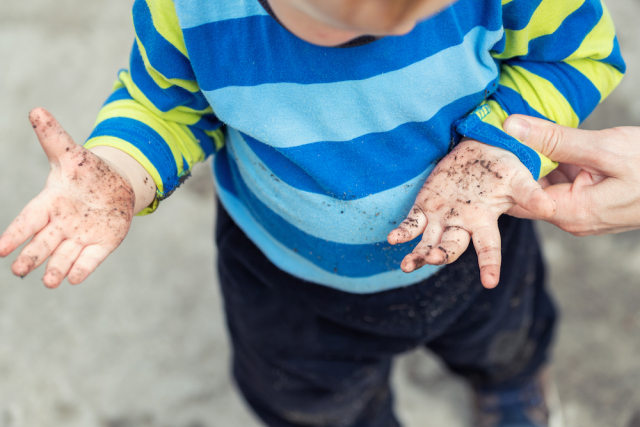
SOOTHING SOIL
We still have a lot to learn about the way friendly bacteria actually work, but new research is showing the huge range of bodily functions they can affect.
Scientists now generally agree that the collection of bacteria, viruses and fungi living in and on the human body — known as the microbiome — is vitally important to immune system development and functioning.
Scientists have also shown that the microbiome does more than regulate the immune system: Some microbes help extract nutrients from food, others help to crowd out dangerous strains of bacteria in the gut, while still others help to produce vitamins that humans may not get enough of from food, such as vitamins B and K.
A robust gut microbiome may be responsible for brain functioning as well. One microbe that the laid-back parent will love is called Mycobacterium vaccae. This soil-dwelling bacteria seems to boost mood. It’s been found to be involved with the production of serotonin, one of the most important neurotransmitters for regulating mood.
Researchers don’t yet know how M. vaccae works, but the fact that it’s commonly found in soil may explain some of the antidepressant effects of gardening.
Even beyond the obviously beneficial microbes in the soil, simply being in contact with a wide range of microbes is good for the developing immune system.
When asked if letting an infant play in the garden without pulling out a wet wipe every few minutes might actually be a good thing, Wilder said: “Absolutely! Playing in dirt exposes kids to new microbes and helps build up their immune systems.
Everyone is born with an immature immune system, so the more we encounter at a young age, the quicker the immune system can recognize the disease and help the body fight off pathogens.”
There is a saying that goes, “dirt won’t hurt.” And it’s often true.
But soil can also contain a wide variety of toxins, depending on where you’re located and the histories of the soils. Dangerous heavy metals deposited by industry such as mercury — and poisonous plants such as nightshade — can be just as dangerous as harmful parasitic infections spread by stray animals. (Those include Toxocara, aka roundworms, which remain a problem for children in the U.S.)
Meanwhile, other parasites that complete their life cycles in the dirt, including hookworms and whipworms (known as helminths), are now thought to secrete chemical compounds that can keep the immune system in tune.
In fact, an emerging form of immunotherapy is helminthic therapy, which uses small doses of parasitic worms or worm eggs to fight autoimmune diseases and immune disorders.
Ew, right? And certainly not for kids, right?
Well, doctors in the U.S. aren’t using the therapy yet, but the Helminthic Therapy Wiki website lists anecdotes of children 18 months and younger undergoing helminthic treatments to successfully treat inflammatory bowel disease, extreme eczema and food allergies, too.
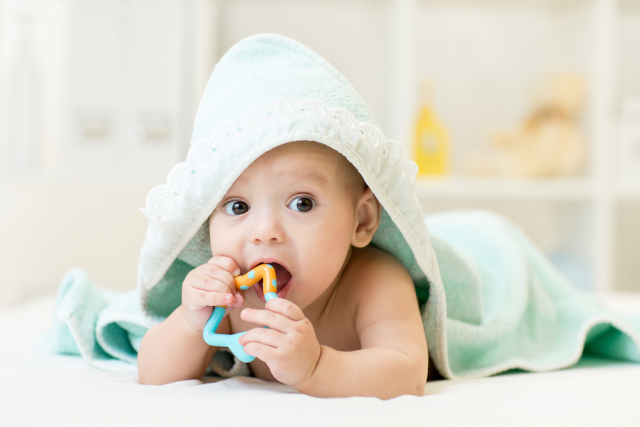
BUGS FOR SALE
Is it possible to give your baby a dose of dirt and bacteria in a cleaner way? This answer is still up for debate.
There are numerous commercial probiotics for sale, and some of them are marketed as specifically formulated for infants. Probiotics can be integrated into food or taken as a pill or chewable — and they typically contain one or several strains of beneficial bacteria.
Some studies have shown that they’re effective at preventing airborne and food allergies, eczema and asthma when taken in infancy. Yet probiotics, which are classified as supplements and not drugs by the FDA, aren’t regulated by the government. Their medical benefits may not have been tested, nor have their safety or potency. In fact, while probiotics make up a multi-billion-dollar industry, they’re ultimately unregulated and vastly understudied.
Still, many experts find that probiotics are likely beneficial and seem to pose little risk.
Alioto said: “As our soil quality decreases, our food quality decreases,” making probiotics potentially very important additions to today’s diet. “There are many different studies that have been, and will continue to be, completed about the health benefits of probiotic supplements.”
Additionally, the gut is highly interlinked with the immune system.
“About 70% of your immune system comes from the lymphoid tissue in your gut, so caring for it is essential,” Wilder said. “Whether it be decreasing inflammation of the lining, or getting good bacteria in there, you should care about your child’s gut lining.”
Wilder and Alioto suggest going through a naturopathic office rather than a drug store or website to buy probiotics, because quality control is lacking for many products sold directly to consumers.
There’s another reason to use caution with commercial probiotics: They can cost a lot of money.
By contrast, time-tested, probiotic foods — sauerkraut, yogurt, blue cheese, kimchi, kefir, kombucha and tempeh — often cost far less. Alioto recommends all of the above but suggests staying away from foods such as granola bars or drink mixes with probiotics added.
CONCLUSION
There’s no guarantee that letting your infant play in dirtier environments will impact her immune system or mood. But most of the time, letting the house go a little won’t hurt, and might even be of benefit.
Indeed, perhaps we need a more hands-off approach to child health. For instance, the use of antibiotics in infants has been linked to asthma and allergy in 6-year-olds.
Wilder said: “A lot of doctors today just pacify parents by giving antibiotics,” even when they aren’t needed, “because it lessens the parents’ anxiety.”
But what if you could relax into the idea that less is more? What if the best move might be no move at all?
If you choose to spend a little more time playing with Baby — or sleeping, or just sitting around — and a little less time cleaning, there’s no need to feel guilty.
Sophia Strosberg is a Twin Cities journalist and health researcher whose 3-year-old daughter is a burgeoning soil scientist.
Note: This article is not intended to serve as medical advice. Please seek the advice of a doctor or pediatrician before engaging in any practices described in this article.



